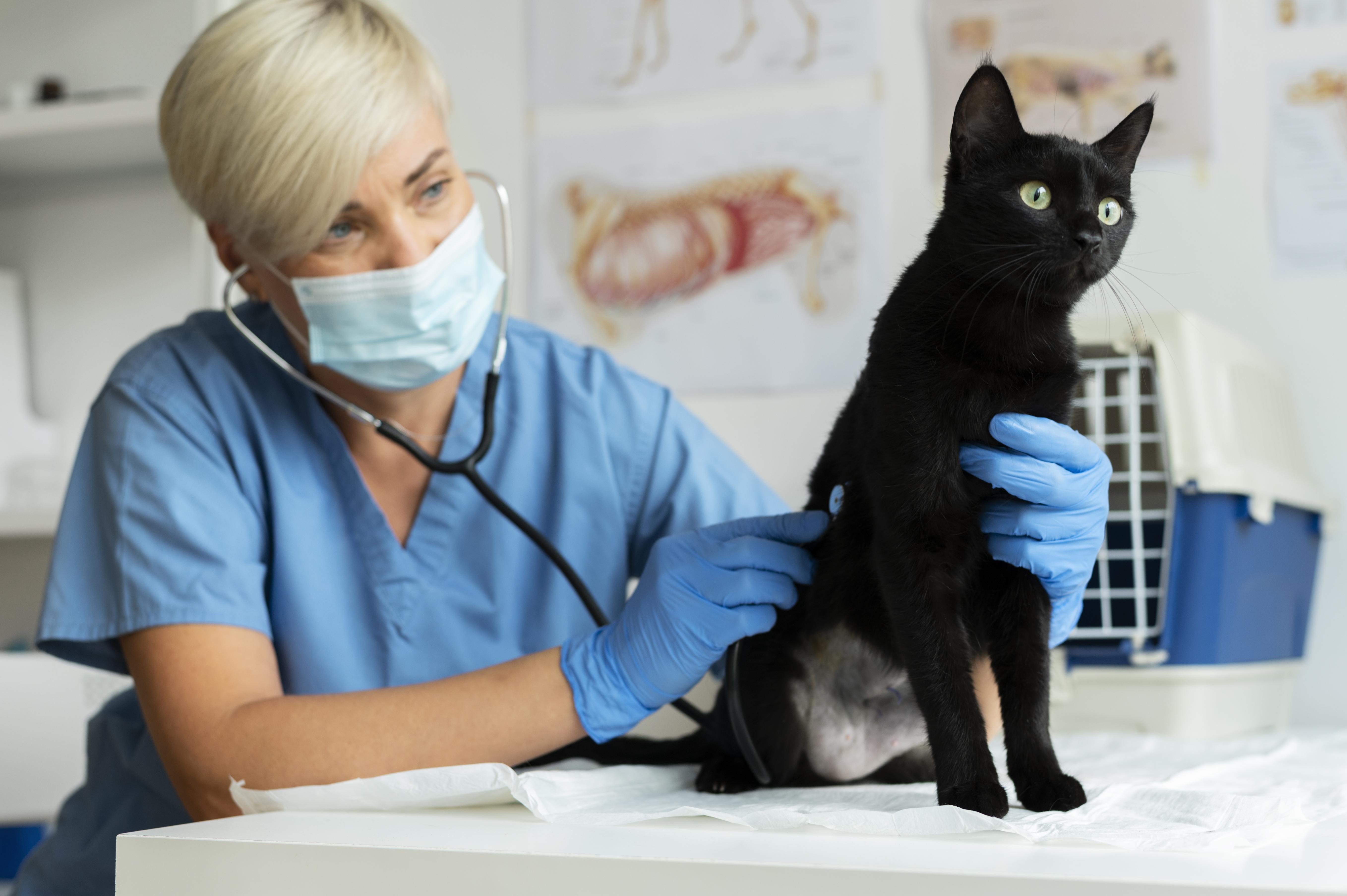What is FIP?
Feline Infectious Peritonitis (FIP) is one of the hardest diseases to diagnose in cats.
It is caused by a mutation of the common feline coronavirus (FCoV). In most cats, this virus only causes mild or unnoticed gut infections. But in some cats, it mutates and develops into FIP.
Forms of the Disease
FIP appears in two forms: effusive (wet) and non-effusive (dry).
- Wet FIP causes fluid build-up in body cavities. This leads to a swollen belly (abdominal distension) or fluid in the chest (pleural effusion).
- Dry FIP causes lumps of inflammation in organs such as the eyes, brain, or kidneys. This often shows up as neurological or eye-related problems.
Because symptoms vary so much, FIP can be difficult to recognize.
How Vets Make a Diagnosis
Diagnosis depends on combining the cat’s history, age, breed, clinical signs, and lab tests. Young, purebred cats are more commonly affected.
Nonspecific signs include long-lasting fever, weight loss, and low energy. If normal treatments do not work, vets may suspect FIP.
Blood tests often show changes such as:
- High globulin levels
- High total protein
- Low albumin-to-globulin ratio
- Sometimes, low lymphocyte counts
These changes support a diagnosis but do not prove FIP.
In wet FIP, testing the fluid can provide important clues. Fluid is often high in protein but low in cells. The Rivalta test can be done quickly in the clinic, but it is not very specific.
Confirming the Disease
Definitive tests include RT-PCR to detect FCoV RNA, and tissue tests (immunohistochemistry or immunofluorescence) to show viral antigens. These tests are especially useful in dry FIP cases.
However, PCR cannot always tell the difference between harmless FCoV and the FIP-causing type. Results must always be interpreted alongside lab and clinical findings.
Imaging, such as ultrasound or MRI, can help find affected organs or fluid. These results also guide vets on where to collect samples for cytology or histopathology.
The Challenge of Diagnosis
In practice, diagnosing FIP is rarely straightforward. It requires combining evidence from clinical signs, lab tests, and imaging, rather than relying on a single test.
Vets must balance the urgency of treatment with the limits of current tools.
The Future of FIP Diagnosis
A definitive diagnosis of FIP in practice is rarely certain. Instead, it is a matter of probability that depends on combining clinical signs, lab results, and imaging, rather than relying on one single test.
Vets must balance the urgency of treatment with the limits of current diagnostic tools, weighing both supportive and confirmatory findings to guide their decisions.
Ongoing research into rapid antigen tests, point-of-care PCR, and new biomarkers may improve both the speed and accuracy of FIP diagnosis. These advances could give veterinarians more reliable tools to manage this consistently serious disease.
Reference: GSEPEM. (n.d.). [Image from website]. GSEPEM. https://gsepem.com/?g=404111816
🔎 Recommended Screening Products for Suspected FIP Cases
| Product Name | Purpose in FIP Diagnosis | Veterinary Use |
| FCoV Ab Test | Detects exposure to feline coronavirus (FCoV), the precursor virus of FIP. | Helps identify cats at risk of mutation into FIP. |
| FCoV Ag Test | Detects active coronavirus antigen in cats. | Supports evaluation of ongoing infection status. |
| Peritonitis Detection Kit | Aids in identifying effusive (wet) FIP through fluid analysis. | Useful in suspected wet FIP with abdominal or thoracic effusion. |
| Feline 3X (FeLV Ag / FIV Ab / FCoV Ab) | Combined screening for retroviruses (FeLV, FIV) and coronavirus antibodies. | Provides a broader immunosuppression profile, since co-infections may complicate FIP prognosis. |
| Feline 3DX (FPV Ag / FCoV Ag / Giardia Ag) | Detects FCoV antigens along with FPV and Giardia. | Useful in differential diagnosis where diarrhea or systemic illness overlaps with FIP. |
| Toxoplasma IgM/IgG Ab Test | Screens for toxoplasmosis, a major differential diagnosis for neurological and ocular FIP signs. | Helps rule out diseases mimicking dry FIP. |
| Feline Blood Typing Kit | Determines blood type before transfusion in severe FIP cases with anemia. | Supportive tool for advanced care management. |
📌 Note for Veterinarians:
For purchase, please contact our sales team or customer service to receive professional consultation and ordering details.
📩 How to Order
All rapid test kits listed above are available exclusively to licensed veterinarians and veterinary hospitals. To place an order or request a quotation, please contact our sales team or email our customer service:
📧 service@bioguardlabs.com
☎️ Please include your hospital name and contact number in the email so our sales representative can follow up with you directly.

